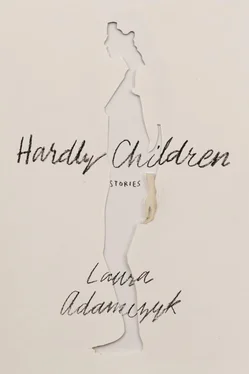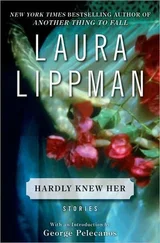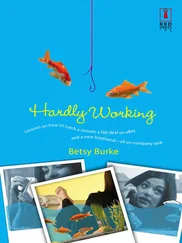Sal. Sal is his name, Cheryl thinks, a fact she likes knowing. She’s already given the recommended sixty-dollar “friend of the theater” donation, and she’ll probably put a couple of bucks in the box on her way out. She’ll just keep giving and giving, she thinks.
She leans back, stretches her arms out to either side, and with a soft fist, gently knocks JD in the jaw: Pow, she says. I don’t like that guy.
What? Oh, yeah, funny, he sniffs. He takes out his phone, its screen lighting his face.
Last week at the bar, a man whom Cheryl had once gone out with started giving her trouble, calling her names in a voice that was too loud, that would have embarrassed her were she the kind to get embarrassed. When JD returned from the bathroom to find the man leaning over her, both hands on the table, spitting bile, JD, in a swift, clean motion, approached, pulled him back with one hand, and, with the other, punched him in the face.
The look that flashed across Cheryl’s face just then, with the man deflating into a pile on the floor—a new look surging up from some hidden wonder in her stomach: Whoa, what the fuck, JD? Not anger, but a true marveling confusion, a please-fill-in-this-blank what?
I don’t like that guy, he responded, pointing down, one sort of fierceness draining from him, another rising in his throat.
I guess not.
Then the owner coming up, putting a hand on JD’s shoulder because they were friends, because JD used to date his younger sister, Angela, in high school, the owner the real reason why they came to this bar in the first place, with its washed-out, graying beer posters and fake wood paneling, the owner, Jerry, saying, You two should probably leave.
Shit, Jerry, I’m sorry.
Cheryl up now, the three of them looking down at the black-haired man on the floor like a glass of beer one of them had spilled and then the spill sitting up, jerking away as JD and Jerry bent down to help him. JD setting him in a chair and Jerry turning behind him, asking the bartender could he put some ice in a towel, then turning back, saying, I’ll give you a call tomorrow. And Cheryl, already having gathered her purse and tucking it beneath her arm like a stolen loaf of bread, led the way, she and JD slinking out, the eyes of the other patrons still on them, the place pulsing with excitement: Something happened! Just now! We saw it!
Outside in the parking lot—the night cooler and quieter—the two of them stood, not quite knowing how to stand.
Jesus, JD. You got some pent-up testosterone or what?
He walked a few strides to his left then returned. His shoulders, the broad shoulders of a swimmer, were pushed back, his arms out, tense like another man’s appendages attached to his body, but then, with an exhale, his torso folded inward, chin dropping to his chest. Cheryl leaned on one leg, trying to decide what to do with her arms.
I’ve never punched anyone before, JD said.
Could’ve fooled me.
I’ve broken up plenty of fights.
Cheryl nodded to his pacing.
But I’ve never liked that guy. He’s a jerk, he said.
No friend of mine.
Think he lost any teeth?
I don’t think you got him that good.
He paused in his turning, spread out his hand, examined the back of it, a hand more bony, more delicate than anything else. Looking up, he asked, Are you okay?
I’m fine.
He started walking again.
Are you okay, JD?
Stopping, turning back to her, his legs slow, his head filled with air. Yeah, fine, he said.
She regarded the sheen of sweat on his forehead, thought of the way his anger had broken away from him. She thought of the only time she’d ever seen her mother drunk. A careful, staid woman with long, thick hair the color of dead grass whom Cheryl had only known to drink at weddings. It was the night her older sister had earned her law degree and Cheryl had met her and their parents downtown: one of the city’s oldest restaurants, a small Belgian pub with black and white tile and old, round-bellied waiters. Her mother had ordered a glass of raspberry lambic and had quickly become giggly and rosy-cheeked, leaning over to ask the table next to them what they were eating that looked so good, then clapping when their food arrived. Cheryl had been happy that her mother was having a good time, that everyone had had a reason to get dressed up, get into the city, and spend some money. But she remembered feeling a twinge of embarrassment at seeing her mother’s shyness and melancholy fall away, acting so unlike herself, as though people should only ever be exactly who they were.
Well, I should probably take off, Cheryl said. That’s enough excitement for one night.
Right, yeah, JD said, putting his hands into his pockets. I’m sorry.
It’s fine. What are you apologizing for? It was kind of awesome .
He sniffed. Yeah, right. Jesus.
See you on Monday, she said. And re lax . She was not standing close enough to put her hand on his shoulder and wasn’t used to touching him anyway, so she turned, and he watched her walk away, watched her put her hand up to wave behind her.
When JD told his wife the story the next morning at breakfast, the drunk man had grabbed Cheryl by the wrist, and his face had been just inches away from hers. He hadn’t meant to lie, but in the telling, JD realized that the scene was, perhaps, different than it had all seemed at the time.
But did you have to hit him? his wife had asked, scraping butter onto a piece of toast.
I know.
What if he sues us?
That guy’s not smart enough to sue anyone.
Let’s hope not.
Jerry said he just got a black eye.
She crunched into her toast, her face caffeinated and awake. Still, I kind of wish I could have seen that, she said.
I did get him pretty good.
That guy’s such a bum. I can’t believe Cheryl went out with him in the first place.
Well, JD started, but he couldn’t quite figure out what point he was working toward. It was a small town, but even so. His wife was right. That guy was a bum and Cheryl had agreed to go somewhere with him, chat him up, and who knows what else. But even now in the half dark of the theater he doesn’t want to take it back. It had felt good, natural. Something he didn’t have to think about before doing, something he didn’t have to mull over. It had felt like the final step in a dance he has known all his life: one, two, three—POP. JD doesn’t dance but sometimes imagines swaying with Cheryl to something old and full of heartache, something by Patsy Cline or any other Technicolor singer lost to tragedy. It’s not because he thinks of touching her—he keeps those kinds of thoughts inside the quiet, locked rooms of his mind—but because sometimes she seems sad and he wants to step inside that sadness with her, swim in that dark, warm pool where her laughs come out heavy and sigh-like, where she must think she remains unseen.
Are those new jeans? Cheryl asks, slumping down in her seat, her hands folded over her stomach.
Yep.
Nice.
I’m not sure I like them.
Yeah, me neither.
Then what’d you say that for?
I don’t know, new clothes are funny.
She’s smiling, amusing herself, but he nods, thoughtful. She sits up, digs in her jacket pocket, and offers up her flask. He sneaks a peek behind them. The other patrons are ambling up the aisle into the yellow lights of the lobby.
Come on , Grandma.
He bristles, taking the flask. Unscrewing its tiny silver top, he dulls his eyes at her.
You’re a bitch sometimes, you know that?
I do. I’m just surprised it took you this long to figure out.
He takes as much of the liquor into his mouth as he can and swallows.
Jesus, what’d you put in here?
Читать дальше











